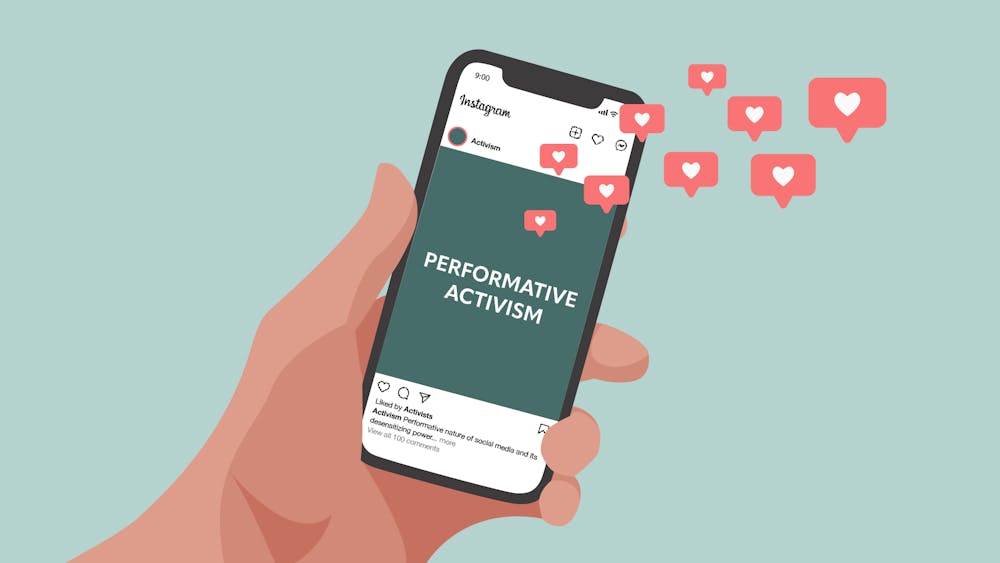
The term ‘Generation Z’ has been used ad nauseum over the past few years, especially in describing the popularity of social media. However, this conflation may have some merit — we were the first to post about middle school dances on Instagram and enter high school with Snapchat scores in the hundreds of thousands. Known as digital natives, it is no surprise that 97% of our generation uses one of seven major online social platforms, with a staggering 72% using Instagram alone.
While social media use has remained high, social media itself has changed. Its latest evolution: a platform for social justice activism. Many, myself included, point to the horrific events of the summer of 2020 as a marked turning point in social media use among many users, especially those of Generation Z. Apps like Instagram, Facebook, and Twitter became populated with infographics, petitions, donation funds, informative articles and endless videos, pictures and descriptions of tragic events.
Ever since, these platforms — Instagram especially, in my experience — have become spaces for the perpetual rise and fall of social activism trends. From the outset, I found it unsettling to see people openly repost and publicize the brutalization of individuals on a social media platform. Even though the frequency of these posts has decreased as people learned what is and isn’t acceptable to post on social media, displays of outright violence to this day still find their way into posts and stories. This consistent reposting of violence was, and continues to be, indicative of a larger psyche that has found a place in our generation: one based in performative activism.
Take the recent purchase of the McDonald’s at 40th and Walnut by the University, for example. Upon the public announcement, there was genuine outrage from some of my peers which realized itself in social media posts with long captions explaining how this latest stage of gentrification will harm the community by decreasing affordability. The few posts of this nature were informative and made me think about the lost-lasting ramifications of a seemingly innocuous campus expansion. However, where these posts ended, so did their impact. Many simply reposted these thought-out criticisms with no unique additions, or worse, trite quips.
I concede that the simple act of reposting spreads information farther and wider than ever before possible, but the danger lies in that simplicity. In as little as three taps, anyone can share a post without spending even one extra second to reflect on what it is they are sharing. And therein lies the problem: a culture of activism, which is oftentimes inherently performative, with no reflection required. Sure, it’s easy to repost someone else’s tirade on gentrification in order to signal to others that you similarly care, but do you really? Have you considered the real people and their real families that are forever impacted by the process? Have you taken the necessary time to digest the true implications of Penn’s history of gentrification?
If we, on an individual level, do not take the time and effort to deconstruct our own presuppositions and reflect on each of our roles in upholding destructive institutional practices, then how can we expect others to? There is no guarantee that the followers who interact with your repost don’t follow the same routine of reposting for the sake of virtue signaling. And where this becomes even more harmful is that at this point, for nearly two years, Instagram has been flooded with a constant barrage of posts about horrific events. Habits of reposting under the guise of spreading awareness have in fact so desensitized many of us to the point of precluding meaningful reflection.
Seeing people dying, pushed out of their homes, brutalized, and victimized is not normal. But social media offers us a distance from these realities and bestows upon us some sort of responsibility to just click three times and repost. This mindset which has become imbued in our generation not only makes our social media activism often useless but harms us as people by detaching us from the value of human life, distorting the beauty and diluting the horror of the world around us.
In choosing to use social media as a platform for activism, with none of the mechanisms of accountability implicit in real-life activism, additional introspection is required. We must all confront our true motivations for posting links and infographics while taking ample time to truly reflect on, comprehend, and digest the content of what we share. If you want to see real change, Instagram isn’t the answer. In fact, it's the problem.
VINAY KHOSLA is a College first year studying philosophy and political science from Baltimore, Md. His email is vkhosla@sas.upenn.edu
The Daily Pennsylvanian is an independent, student-run newspaper. Please consider making a donation to support the coverage that shapes the University. Your generosity ensures a future of strong journalism at Penn.
Donate







